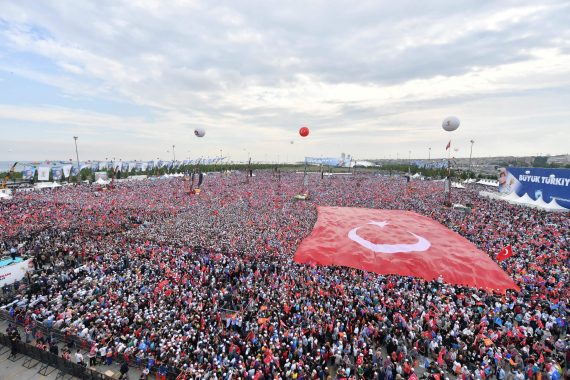On 24 June, Turkey’s presidential and parliamentary elections will be held. Subsequent to the declaration of the date of the snap elections, on 18 April, political parties in Turkey started their campaigns and published their election programs. The upcoming elections represent a final switch to Turkey’s new system of government which was accepted by a referendum on 16 April last year. The elections to take place in the next four days are also the first elections in Turkish history according to which both elections are executed simultaneously.
To get a clear perception of the recent election period, I’ll try to point out some crucial issues.
First of all, even though Western media outlets do not address this issue, the presidential elections are conducted in a diversified political atmosphere. There are six presidential candidates representing different political and societal expectations striving for the country’s highest political position. This is actually a diversity covering most of Turkey’s dominant political camps. In addition, ten political parties are participating in the parliamentary elections. The very interesting issue during this election period is the fact that at least six parties will definitely be in the parliament subsequent to the elections due to the new law on election alliances. According to this law, which was approved by a majority vote led by the ruling AK Party and the MHP in March 2018, the country’s 10 percent electoral threshold will still be in place but it will apply to the sum of the votes of the parties in the alliance. Thus, the number of MPs will be determined according to the sum of the votes of the election alliance. Interestingly, this issue which gives the possibility also to small political parties to join the parliament, is not addressed by foreign media due to the fact that this step has been initiated by the AK Party and MHP.
Furthermore, apart from President Erdogan and his party’s campaign, one has noticed that among the opposition only the CHP’s presidential candidate, Muharrem Ince, was able to make some striking statements. President Erdogan, for instance, while conducting his campaign, stressed the need for a strong executive and legislative organ in the upcoming period. Thus, he asked the people to vote for him as well as his AK Party in parliament. On the other hand, Ince insisted on an election campaign which differentiated itself from previous CHP discourses and biases. By this, Ince tried to portray himself within a rather conservative Muslim circles-friendly and pro-HDP image, which, however, totally contradicts the CHP’s traditional positions. It’s also fascinating that while Ince has been appointed as the party’s presidential candidate, CHP Chairman Kemal Kilicdaroglu excluded all MP candidates, who are known to be close to Mr. Ince, with regard to the upcoming parliamentary elections. This image actually displayed who has the control of the party and who has concrete and real expectations from the election results.
By focusing on the other parties presidential candidates and their campaigns, its seems that no candidate was able to neither determine nor influence the political discourse during the recent two months. For instance, the MHP-split Iyi Party’s leader Meral Aksener, who runs as the Iyi Party’s presidential candidate, had no concrete proposal for Turkey’s future despite rather populist statements. For Mrs. Aksener, it’s also very frustrating due to the fact that President Erdogan did not address her once during the entire election campaign. To be honest, it cannot be said that there is public support regarding the Iyi Party even though Western politicians supported her as well.
Recommended
The Kurdish left ethno-nationalist HDP’s presidential candidate Selahattin Demirtas and his party HDP, though, are extraordinarily supported by foreign media and even foreign political circles. By taking the HDP’s propaganda into consideration, the misleading conclusion above all in Western circles occurs, such as the false portrayal of the party as a quite liberal-leftist party that allegedly prioritizes human rights etc. By this, the party’s actual closeness and even links to the PKK terrorist organization is disregarded by foreign media and HDP supporters. For instance, it’s even ironical that the HDP’s presidential candidate, Selahattin Demirtas, was publicly supported by his brother Nurettin Demirtas, who lives as a PKK-terrorist in Iraq’s Qandil mountains. Of course, besides various statements and positions which do support the PKK, this fact has also been disregarded by HDP supporters and Western media.
Other performances of presidential candidates, such as the Felicity Party’s Chairman Temel Karamollaoglu and the Patriotic Party’s Chairman Dogu Perincek, have been also very low. Neither certain statements of these leaders were seriously taken into account by other leaders nor their election programs seem to persuade and do excite the electorate.
Thus, it’s quite obvious that the AK Party dominates the election campaign while the CHP seems to be divided into two parts. On the one hand, Muharrem Ince is trying to win the presidential election while Kilicdaroglu sets a focus on the parliamentary election and a potential inner-party rivalry subsequent to the elections. On the other hand, it’s striking that Ince makes use of populism by not explaining several promises in depth. For instance, Ince declares that he has no problem with women who wear headscarves while he does not explain his previous and well-known anti-positions just some years ago. The same counts for his populist statements with regard to HDP voters.
The AK Party stresses the new Turkish presidential system in the upcoming period while the CHP –and all other opposition parties except the MHP– do not explain how they schedule to switch back to a parliamentary system. This issue gets even more complex when Ince states that he wants to lead the country as an executive president while Mrs. Aksener calls for a rapid future plan. Finally, it’s also very bizarre that the dominant opposition parties do not address Turkey’s fight against terrorist organizations such as the PKK, FETO in depth – neither in the candidates’ nor the parties’ program.





